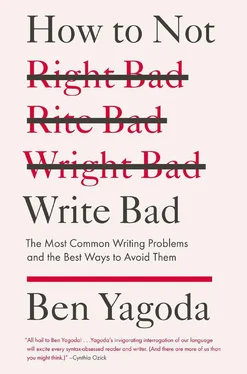Sometimes the issue is less power of suggestion and more personal predilection. Tom Wolfe is enamored of exclamation points, John Irving of semicolons (examine his books and you’ll see what I mean), the New Yorker magazine of commas, and Ben Yagoda of parentheses. Emily Dickinson was quite fond of dashes. I don’t know about those other worthies, but quite a lot of my revising time is spent getting rid of parens (while still keeping enough of them for my writing to sound like me). If you’ve got a go-to typographical move, this is the strategy to follow.
A couple of pieces of punctuation are worth special mention. The first is exclamation points! Or, rather, the first is exclamation points. They’ve spread way beyond Tom Wolfe: if you’ve spent any time on e-mail, Facebook, or Twitter these days, you know that they are the punctuational coin of the realm. Sometimes, one isn’t enough, and you need two, three, or even four to show adequate enthusiasm. In fact, when I first got into texting with my twenty-two-year-old daughter, Maria, I was ending sentences with periods, as is my wont. She told me to use either exclamation points or nothing: the periods made it seem that I was being ironic or pointedly unenthusiastic. But what’s good for texting is bad for text. That is, stay away from exclamation points, except, as a matter of fact, when you’re being ironic or playful. Like this! Even then, use them sparingly. *
And what of the rhetorical question? It’s definitely overused, often serving as nothing more than artificial throat clearing at the beginning of a paragraph. Instead, it usually works better to just dive right into what you want to say. The RQ can be a useful device, but it has to be deployed skillfully. As my first boss, Myron “Mike” Kolatch, the longtime editor of the New Leader magazine, used to say: “When you ask a question, answer it immediately”—the way I did at the beginning of this paragraph. That’s as opposed to something like:
[ Is City Hall in compliance with new federal energy regulations? In 2007, Congress passed legislation requiring… ]
No good: that question just lies there, unanswered, puzzling or bewildering the reader. First tell us about the regulations, then address the issue of whether or not City Hall is following them.
B. Words and Phrases
1. REALLY QUICK FIX: AVOID THESE WORDS!
Some writing adjustments are hard. But eliminating or at least sharply reducing these words from your prose is painless and shows swift results.
a. Unique
Unique is a much-hated word, but I actually hate it for different reasons than most people do. The most frequent complaint is that it technically means one of a kind but is commonly used to mean unusual :
[ The most unique thing about him is that he has a fauxhawk. ]
The argument goes that there are no degrees of uniqueness; either a thing is unique or it isn’t. Consequently:
He has a fauxhawk.
Or take a look at these two sentences from a student’s profile of a librarian (whose name has been changed):
[ When the thought of a typical librarian comes to mind, Associate Librarian Raymond McCarthy tries to steer clear of the typical stereotypes associated with the other employees working in the campus library. His everyday attire and approachability prove that he is much more unique than the average librarian. ]
Unique is hardly the only problem in the passage; wordiness, stereotyping, cliché, and a dangling modifier come to mind right off the bat. But the U-word, along with the repetition of typical , is probably the most easily addressed. That is, if you want to say he’s approachable and wears everyday attire, just say so, and leave the issue of uniqueness out of it. (Of course, it would be better to specify exactly what he’s wearing, and give an example of his approachability.)
Nonunique unique is certainly something to be concerned with, but even worse, to me, is the now very common use of unique as a synonym for admirable, impressive , or some quality that is vaguely positive but has no other attributes. For an assignment in which students were asked to nominate a Web site for the Pulitzer Prize in online journalism, someone in my class wrote:
[ The criteria that made this site able to be nominated are because of the uniqueness of the content it possesses. ]
Again, one looks on a veritable cavalcade of infelicities, leading off with bad parallelism, infelicitous use of the passive, and wordiness. What’s being said, I think, is:
The site has excellent content.
Then there’s this:
[ Iron Hill is a unique restaurant that’s a favorite for Homecoming and Graduation. ]
Not only is that advertising-speak, but it’s bad advertising-speak. If you take the effort to find out or figure out something real (the opposite of advertising-speak), you will produce a stronger sentence.
Iron Hill is already fully booked for Homecoming and Graduation.
I’ll pause here because the above example illustrated a point that’s going to come up again and again in this section. Being unique- less isn’t the only reason why the second version is better. It also has a piece of relevant and specific information: the fact that the restaurant is sold out. The writer of the first sentence doesn’t know much about Iron Hill — other than a vague sense that it’s popular — and has produced weak writing. The writer of the second sentence has taken the trouble to find out an important fact and has used it to produce strong writing.
This is no coincidence. If you are un- or underinformed about your subject, you will hem and haw, engage in the passive voice and qualifiers, and overgeneralize. If you take the trouble to fully research it — and, equally important, think hard and rigorously about it — you’ll be specific, precise, and authoritative. In other words, knowledge leads to good writing. That is simply a corollary of perhaps the most important of all writing mantras: show, don’t tell.
This issue never, ever goes away, because telling is much easier than showing. You can sit back in your easy chair, pluck a few adjectives out of the thesaurus, and you’re off to the races. To show, you have to get up off your butt: literally, by doing some research and reporting, or figuratively, by going beyond your initial top-of-the-head thought and lifting and arranging some nouns and verbs.
(I hereby give you permission to use unique if you really and truly mean that the thing being described is one of a kind, cross your heart.)
b. Literally
In conversation, it’s no big deal to use literally when you mean figuratively . If you said, for example, “I literally turned the house upside down looking for that checkbook,” your listeners would understand that your house is still on its foundation. However, this literally literally makes for bad habits and therefore bad writing. No one will misunderstand you, but your readers will raise a collective eyebrow. You might be tempted to use the word when it’s technically correct — for example, writing I was literally up all night in reference to a night in which you did not sleep. Resist the temptation and stay away from literally. It’s stronger and cleaner to serve the facts straight up: I was up all night.
c. Myself
The English language is being inundated with myself s, the result, I think, of creeping wordiness and uncertainty in many cases over whether I or me is correct. So we get a lot of:
Читать дальше












